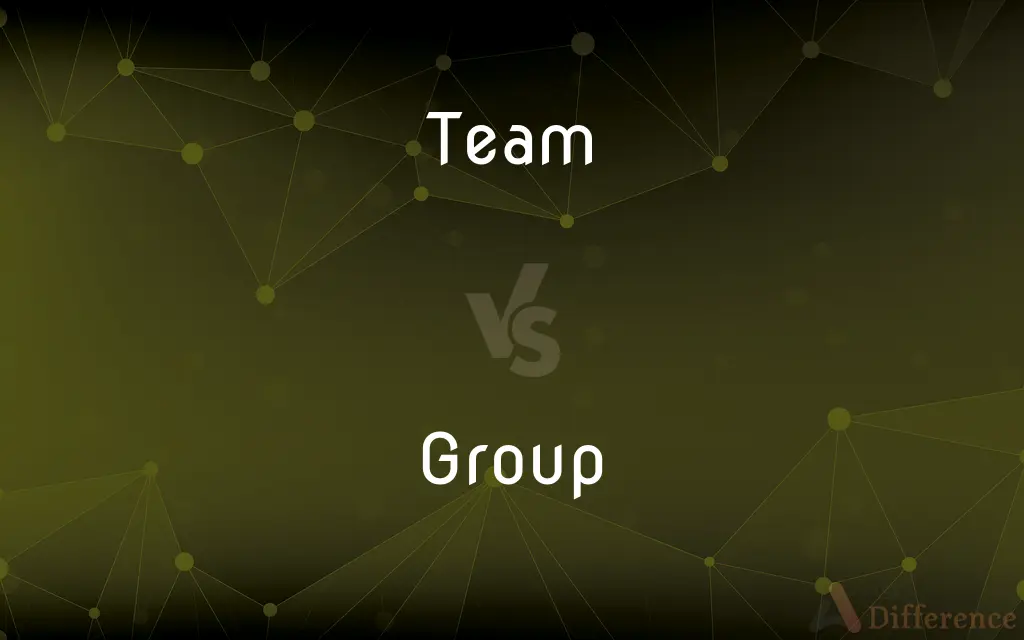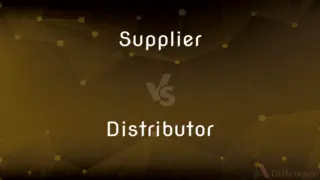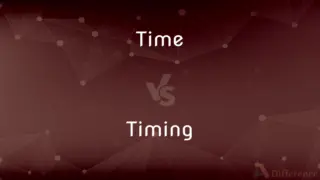Team vs. Group — What's the Difference?
By Tayyaba Rehman & Fiza Rafique — Updated on April 18, 2024
A team is a group of individuals working collaboratively towards a common goal with coordinated efforts, often with defined roles; a group consists of individuals gathered together without necessarily having a shared goal or coordinated interaction.

Difference Between Team and Group
Table of Contents
ADVERTISEMENT
Key Differences
A team is defined by its structure and purpose, where members are united by common objectives and work interdependently. Each member often has a specific role that complements the roles of others, enhancing overall effectiveness and efficiency. On the other hand, a group is simply a collection of individuals who may share a location or a common characteristic, but do not necessarily interact towards a common purpose.
Teams are characterized by high levels of collaboration and communication. Members coordinate their efforts to achieve shared goals, often requiring ongoing interaction and adjustment of roles. In contrast, groups might meet sporadically and lack consistent interaction, focusing instead on individual tasks or interests without a unifying project or outcome.
The success of a team is measured by its ability to achieve predefined objectives efficiently and effectively. Success metrics often include performance outcomes, the achievement of goals, and the ability to solve problems collaboratively. Whereas, the success of a group could be less defined and may not involve collective productivity or goal attainment.
Leadership in a team is typically distinct and plays a crucial role in directing efforts and nurturing skills to meet the team's goals. This leadership may be formal or emerge organically based on skills and roles. Conversely, leadership in a group may be absent or rotate informally among members without a clear, ongoing directive or responsibility.
Teams often undergo stages of development famously identified as forming, storming, norming, and performing. This process helps them become more effective over time. Groups, however, may not experience these stages as their interaction is not necessarily aimed at achieving collective performance or results.
ADVERTISEMENT
Comparison Chart
Purpose
Defined goals and objectives
Gathered for various reasons, not always with a common goal
Interaction
High, with coordinated efforts
Variable, may not be coordinated
Success Measurement
Achievement of specific goals
Not necessarily goal-oriented
Leadership
Defined, with specific roles
May not have formal leadership
Development Stages
Follows stages of team development
Does not follow specific development stages
Compare with Definitions
Team
Common goals.
Each team member has a role that contributes to the group's objectives.
Group
Shared location or characteristic.
The group of attendees at the seminar shared an interest in technology.
Team
Collaborative unit.
The project team worked together to meet the deadline.
Group
Collection of individuals.
The discussion group meets weekly to talk about various topics.
Team
Coordinated effort.
The team coordinated their efforts to maximize efficiency.
Group
Individual tasks.
Each group member works on a different aspect of the project.
Team
Performance-driven.
The team's performance is reviewed at the end of each quarter.
Group
Sporadic meetings.
The study group meets irregularly, depending on members' availability.
Team
Defined roles.
In our team, Mark is the designer while Lucy handles the coding.
Group
Informal interaction.
The group's interactions are casual, without structured meetings.
Team
A team is a group of individuals (human or non-human) working together to achieve their goal. As defined by Professor Leigh Thompson of the Kellogg School of Management, "[a] team is a group of people who are interdependent with respect to information, resources, knowledge and skills and who seek to combine their efforts to achieve a common goal".A group does not necessarily constitute a team.
Group
An assemblage of persons or objects gathered or located together; an aggregation
A group of dinner guests.
A group of buildings near the road.
Team
A group on the same side, as in a game.
Group
A set of two or more figures that make up a unit or design, as in sculpture.
Team
The members of a team who are actively playing at a given time
After a stellar performance in last week's game, the shooting guard was promoted to the starting team.
Group
A number of individuals or things considered or classed together because of similarities
A small group of supporters across the country.
Team
A group organized for work or activity
A team of engineers.
Group
(Linguistics) A category of related languages that is less inclusive than a family.
Team
Two or more draft animals used to pull a vehicle or farm implement.
Group
A military unit consisting of two or more battalions and a headquarters.
Team
A vehicle along with the animal or animals harnessed to it.
Group
A unit of two or more squadrons in the US Air Force, smaller than a wing.
Team
A group of animals exhibited or performing together, as horses at an equestrian show.
Group
Two or more atoms behaving or regarded as behaving as a single chemical unit.
Team
A brood or flock.
Group
A column in the periodic table of the elements.
Team
To harness or join together so as to form a team.
Group
(Geology) A stratigraphic unit, especially a unit consisting of two or more formations deposited during a single geologic era.
Team
To transport or haul with a draft team.
Group
(Mathematics) A set, together with a binary associative operation, such that the set is closed under the operation, the set contains an identity element for the operation, and each element of the set has an inverse element with respect to the operation. The integers form a group under the operation of ordinary addition.
Team
To form a team or an association. Often used with up.
Group
Of, relating to, constituting, or being a member of a group
A group discussion.
A group effort.
Team
To drive a team or truck.
Group
To place or arrange in a group
Grouped the children according to height.
Team
A set of draught animals, such as two horses in front of a carriage.
Group
To belong to or form a group
The soldiers began to group on the hillside.
Team
Any group of people involved in the same activity, especially sports or work.
We need more volunteers for the netball team.
The IT manager leads a team of three software developers.
Group
A number of things or persons being in some relation to one another.
There is a group of houses behind the hill;
He left town to join a Communist group
A group of people gathered in front of the Parliament to demonstrate against the Prime Minister's proposals.
Team
(obsolete) A group of animals moving together, especially young ducks.
Group
(group theory) A set with an associative binary operation, under which there exists an identity element, and such that each element has an inverse.
Team
A royalty or privilege granted by royal charter to a lord of a manor, of having, keeping, and judging in his court, his bondmen, neifes, and villains, and their offspring, or suit, that is, goods and chattels, and appurtenances thereto.
Group
An effective divisor on a curve.
Team
A group of people who favor one side of a binary debate that is divided and lacks a well-established clear consensus.
Group
A (usually small) group of people who perform music together.
Did you see the new jazz group?
Team
(intransitive) To form a group, as for sports or work.
They teamed to complete the project.
Group
(astronomy) A small number (up to about fifty) of galaxies that are near each other.
Team
To go together well; to harmonize.
Group
(chemistry) A column in the periodic table of chemical elements.
Team
(transitive) To convey or haul with a team.
To team lumber
Group
(chemistry) A functional group.
Nitro is an electron-withdrawing group.
Team
(transitive) To form together into a team.
To team oxen
Group
(sociology) A subset of a culture or of a society.
Team
(transitive) To give work to a gang under a subcontractor.
Group
(military) An air force formation.
Team
A group of young animals, especially of young ducks; a brood; a litter.
A team of ducklings about her.
Group
(geology) A collection of formations or rock strata.
Team
Hence, a number of animals moving together.
A long team of snowy swans on high.
Group
(computing) A number of users with the same rights with respect to accession, modification, and execution of files, computers and peripherals.
Team
Two or more horses, oxen, or other beasts harnessed to the same vehicle for drawing, as to a coach, wagon, sled, or the like.
To take his team and till the earth.
It happened almost every day that coaches stuck fast, until a team of cattle could be procured from some neighboring farm to tug them out of the slough.
Group
An element of an espresso machine from which hot water pours into the portafilter.
Team
A number of persons associated together in any work; a gang; especially, a number of persons selected to contend on one side in a match, or a series of matches, in a cricket, football, rowing, etc.
Group
(music) A number of eighth, sixteenth, etc., notes joined at the stems; sometimes rather indefinitely applied to any ornament made up of a few short notes.
Team
A flock of wild ducks.
Group
(sports) A set of teams playing each other in the same division, while not during the same period playing any teams that belong to other sets in the division.
Team
A royalty or privilege granted by royal charter to a lord of a manor, of having, keeping, and judging in his court, his bondmen, neifes, and villains, and their offspring, or suit, that is, goods and chattels, and appurtenances thereto.
Group
(business) A commercial organization.
Team
To engage in the occupation of driving a team of horses, cattle, or the like, as in conveying or hauling lumber, goods, etc.; to be a teamster.
Group
(transitive) To put together to form a group.
Group the dogs by hair colour
Team
To convey or haul with a team; as, to team lumber.
Group
(intransitive) To come together to form a group.
Team
A cooperative unit
Group
A cluster, crowd, or throng; an assemblage, either of persons or things, collected without any regular form or arrangement; as, a group of men or of trees; a group of isles.
Team
Two or more draft animals that work together to pull something
Group
An assemblage of objects in a certain order or relation, or having some resemblance or common characteristic; as, groups of strata.
Team
Form a team;
We teamed up for this new project
Group
A variously limited assemblage of animals or plants, having some resemblance, or common characteristics in form or structure. The term has different uses, and may be made to include certain species of a genus, or a whole genus, or certain genera, or even several orders.
Group
A number of eighth, sixteenth, etc., notes joined at the stems; - sometimes rather indefinitely applied to any ornament made up of a few short notes.
Group
To form a group of; to arrange or combine in a group or in groups, often with reference to mutual relation and the best effect; to form an assemblage of.
The difficulty lies in drawing and disposing, or, as the painters term it, in grouping such a multitude of different objects.
Group
Any number of entities (members) considered as a unit
Group
(chemistry) two or more atoms bound together as a single unit and forming part of a molecule
Group
A set that is closed, associative, has an identity element and every element has an inverse
Group
Arrange into a group or groups;
Can you group these shapes together?
Group
Form a group or group together
Common Curiosities
What role does leadership play in teams versus groups?
Leadership in teams is critical and focused on guiding the team towards goal achievement, while in groups, leadership may be less formal and not focused on collective objectives.
How do you measure success in a group?
Success in a group can be harder to define and might be based on individual achievements or the satisfaction of group interactions, rather than collective outcomes.
Can a group evolve into a team?
Yes, a group can evolve into a team if they develop a shared goal and begin to coordinate their efforts more closely.
Are all teams effective in achieving their goals?
Not all teams are effective; their success depends on factors like leadership, communication, and member collaboration.
How does communication differ between a team and a group?
Communication in a team is often structured and continuous, aiming to enhance collaboration and ensure all members are aligned with the team's goals. In contrast, communication within a group may be more sporadic and less focused on collective objectives.
Is there a specific size that differentiates a team from a group?
Size is not a definitive factor between a team and a group. However, teams often are small enough to allow effective interaction and coordination among all members, while groups can vary more significantly in size.
What is the key difference between a team and a group?
The key difference is that a team works towards a common goal with coordinated efforts, whereas a group is a collection of individuals who may not necessarily work towards a common objective.
Can members of a group work independently without affecting the group's purpose?
Yes, members of a group can often work independently since the group's purpose may not necessarily hinge on coordinated efforts or outcomes, unlike in a team where interdependency is key to achieving goals.
How does the structure of a team benefit its members compared to a group?
The structure of a team can provide a clearer sense of purpose, defined responsibilities, and a stronger support system through collaborative efforts, which can lead to higher satisfaction and productivity among its members. In contrast, the looser structure of a group may offer more flexibility but less support for individual or collective achievements.
What makes a team effective?
An effective team typically features clear communication, strong leadership, well-defined roles, mutual respect among members, and a strong commitment to shared goals. The ability to resolve conflicts constructively is also crucial.
Share Your Discovery

Previous Comparison
Supplier vs. Distributor
Next Comparison
Time vs. TimingAuthor Spotlight
Written by
Tayyaba RehmanTayyaba Rehman is a distinguished writer, currently serving as a primary contributor to askdifference.com. As a researcher in semantics and etymology, Tayyaba's passion for the complexity of languages and their distinctions has found a perfect home on the platform. Tayyaba delves into the intricacies of language, distinguishing between commonly confused words and phrases, thereby providing clarity for readers worldwide.
Co-written by
Fiza RafiqueFiza Rafique is a skilled content writer at AskDifference.com, where she meticulously refines and enhances written pieces. Drawing from her vast editorial expertise, Fiza ensures clarity, accuracy, and precision in every article. Passionate about language, she continually seeks to elevate the quality of content for readers worldwide.
















































